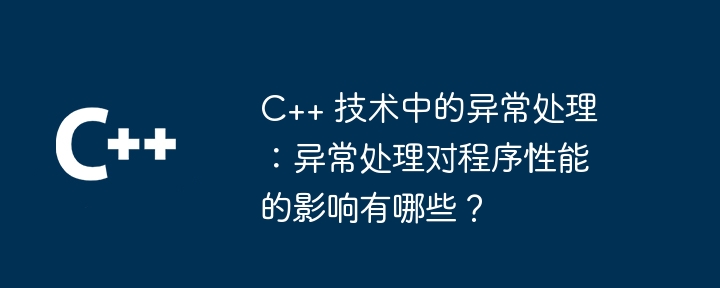
The impact of exception handling on C program performance includes: exception throwing and catching can cause stack operations and additional code paths. Dynamic memory allocation can lead to memory fragmentation. Optimization tips include avoiding excessive exceptions, optimizing exception handlers, using noexcept specifications and exception specifications.

Exception handling in C technology: The impact of exception handling on program performance
In C, exception handling is a Powerful mechanism for managing code errors and unexpected situations. While it provides robustness and maintainability, it also introduces potential performance overhead.
Exception handling overhead
The main overhead of exception handling comes from the following aspects:
Additionally, exception handling may introduce:
Practical case
Consider the following code example:
int divide(int numerator, int denominator) {
try {
if (denominator == 0) {
throw std::invalid_argument("Denominator cannot be zero.");
}
return numerator / denominator;
} catch (const std::invalid_argument& e) {
// Handle the exception
} catch (...) {
// Handle unknown exceptions
}
}In this example, the overhead of exception handling includes:
Optimize exception handling
In order to reduce the performance overhead of exception handling, you can consider the following techniques:
By carefully considering and optimizing exception handling, programmers can minimize their impact on program performance while keeping their code robust and maintainable.
The above is the detailed content of Exception handling in C++ technology: What impact does exception handling have on program performance?. For more information, please follow other related articles on the PHP Chinese website!
 What are the differences between c++ and c language
What are the differences between c++ and c language
 Recommended learning order for c++ and python
Recommended learning order for c++ and python
 Cost-effectiveness analysis of learning python and c++
Cost-effectiveness analysis of learning python and c++
 Is c language the same as c++?
Is c language the same as c++?
 Which is better to learn first, c language or c++?
Which is better to learn first, c language or c++?
 The difference and connection between c language and c++
The difference and connection between c language and c++
 C++ software Chinese change tutorial
C++ software Chinese change tutorial
 Cost-effectiveness analysis of learning python, java and c++
Cost-effectiveness analysis of learning python, java and c++




